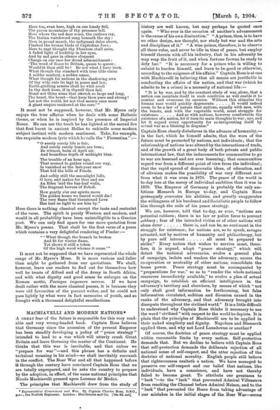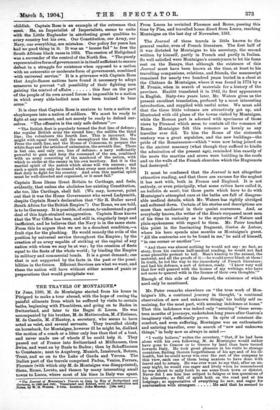MACHIAVELLI AND MODERN NATIONS.*
A GREAT fear of the future is responsible for this very read- able and very wrong-beaded book. Captain Ross believes that Germany since the accession of the present Emperor has been steadily developing a policy of "peace strategy" intended to lead to a war which will utterly crush Great Britain and leave Germany the master of the Continent. He thinks that this war is inevitable, and that unless we "prepare for war"—and this phrase has a definite and technical meaning in his mind—we shall inevitably succumb in the conflict. The Boer War and all that happened before it through the century have convinced Captain Ross that we are totally unprepared, and he asks the country to prepare by the adoption, in effect, of the same national principles that Nicol° Machiavelli pressed upon Lorenzo de' Medici.
The principles that Machiavelli drew from the study of
• Representative Government and War. By Captain Charles Row, D.8.0., p.s.c. the Norfolk Regiment. London : Hutchinson and Co. floe. ed. net]
history are well known, but may perhaps be quoted once again. "Who ever is the occasion of another's advancement is the cause of his own diminution." "A prince, then, is to have no other design, nor thought, nor study but war and the arts and disciplines of it." "A wise prince, therefore, is to observe all these rules, and never be idle in time of peace, but employ himself therein with all his industry, that in his adversity he
may reap the fruit of it, and when fortune frowns be ready to defy her." "it is necessary for a. prince who is willing to subsist to harden himself, and learn to be good or otherwise, according to the exigence of his affairs." Captain Ross is at one with Machiavelli in believing that all means are justifiable in conducting the affairs of the nation, and that war (which he admits to be a crime) is a necessity of national life :— " It is by war, and by the constant study of war, alone, that a nation can maintain itself in such condition as will enable it to combat and overcome its enemies. Without this stimulus the
human race would quickly degenerate It would indeed seem to be a law of nature that nations, equally with men, with the beasts, and with the vegetable world, must struggle for existence And so with nations, however comfortable tho existence of a nation, let it turn its main thoughts to war; aye, and let it regard every opportunity for re-invigorating itself by actual war as a blessing in disguise."
Captain Ross clearly disbelieves in the advance of humanity,— in the fact, which he himself admits, that the wars of the future must be promoted by nations, not individuals; that the relationship of nations is so altered by the interactions of trade,
and of the growth of a great body of both private and publics international law, that the inducements for communities to go to war are lessened and are ever lessening; that communities regard war from a different point of view from the individual ; that the rapid spread of democratic ideas, of education, and of altruism makes the possibility of war very different now from what it was even in 1870. The peace of the world is to-day less at the mercy of individual ambition than it was in 1870. The Emperor of Germany is probably the only am- bitious Monarch in Europe to-day, and Captain Ross grotesquely overrates his abilities, and greatly exaggerates the willingness of his burdened and Socialistic people to follow him through the coils of his peace strategy.
We are, however, told that to-day, as ever, "nations are potential robbers ; there is no law or police force to prevent robbery ; fear of the intended victim or of other nations will alone deter there is, and can be, no sentiment in the struggle for existence; for nations are, so to speak, savages actuated, not by motives of humanity and philanthropy, but by pure self interest all mast be prepared to strike." Every nation that wishes to survive must, there- fore, it is argued, adopt "peace strategy," which will detect the national adversaries, evolve a general plan of campaign, isolate and weaken the adversary, secure the co-operation or neutrality of other nations, consolidate the home power. Peace strategy must be accompanied by "preparations for war," so as to "render the whole national resources immediately available," to evolve a plan of actual campaign, to establish an efficient intelligence in the adversary's territory and elsewhere, by means of which "not only shall good information be forthcoming, but false information circulated, sedition and disunion caused in the ranks of the adversary, and that adversary brought into disrepute throughout the civilised world." It is a little difficult to understand why Captain Ross thinks it necessary to use the word" civilised "with respect to the world he depicts. It is plain that the principles of Machiavelli are to be applied in their naked simplicity and dignity. Napoleon and Bismarck applied them, and why not Lord Lansdowne or another ?
Of course, the doctrine of peace strategy must be applied within reasonable limits by every nation. Self-protection demands that. But we decline to believe with Captain Ross
that self-protection demands the deliberate rejection of all national sense of self-respect, and the utter rejection of the
doctrine of national morality. English people still believe that righteousness exalteth a nation. We have managed to
preserve our self-respect and our belief that nations, like individuals, have a conscience, and have not thereby
failed to become great. To attribute our greatness to "luck "—to the "luck" that prevented Admiral Villeneuve from reaching the Channel before Admiral Nelson, and to the " luck " that prevented the Boers from taking advantage of
our mistakes in the initial stages of the Boer War—seems
childish. Captain Ross is an example of the extremes that meet. He, an Imperialist of Imperialists, seems to unite with the Little Englander in attributing great qualities to every country but his own. Our Constitution, our Army, our Navy, our everything, are mistakes. Our policy for years has had no good thing in it. It was an "insane fad" to free the South African black races in 1834. The cession of Heligoland was a surrender of the control of the North Sea. "The purely representative form of government is in itself sufficient to ensure defeat in a straggle for existence when opposed to a nation with an autocratic or moderate form of government, combined -with universal service." It is a grievance with Captain Ross that Anglo-Saxon nations have found it necessary to adopt measures to prevent "all possibility of their fighting men
_gaining the control of affairs this fear on the part of the people of its own armed forces is impossible to a nation in which every able-bodied man has been trained to bear arms."
It is clear that Captain Ross is anxious to turn a nation of shopkeepers into a nation of soldiers. We must be ready to fight at any moment, and not merely be ready to defend our- selves. "The offensive is the only safe defence ":—
"The British fleet is popularly termed the first line of defence ; the regular British army the second line ; the militia the third line ; the volunteers the fourth line. This is incorrect. We might with equal truth call the unemployed the fifth line, the Press the sixth line, and the House of Commons, to prepare the -white flags and the articles of submission, the seventh line. There is but one, and only one, line of defence : a navy sufficiently powerful to gain and keep the command of the sea, combined with an army consisting of the manhood of the nation, with -which to strike at the enemy in his own territory. But it is the martial spirit of the nation which alone will win success ; and .such a spirit can only be roused when every man considers it his first duty to fight for his country. And even this martial spirit must be well-directed and organised, or it must fail."
Captain Ross likens Great Britain to Carthage, and feels,
.evidently, that unless she abolishes her existing Constitution, he too, like Carthage, shall fall. (We may, however, point -out that it was the Home Government who saved Ladysmith, -despite Captain Roes's declaration that "Sir R. Buller saved South Africa for the British Empire.") Our Rome, we are told, is to be Germany. It is possible, of course, to understand a good deal of this high-strained exaggeration. Captain Ross knows that the War Office has been, and still is, singularly inept and inefficient, and he believes that the Navy is in the same state. From this he argues that we are in a decadent condition,—a fruit ripe for the plucking. He would remedy the evils of the position by universal service throughout the Empire ; by the -creation of an army capable of striking at the capital of any nation with whom we may be at war ; by the creation of fleets equal to the fleets of the whole world ; by binding the Empire in military and commercial bonds. It is a great demand; one that is not supported by the facts in the past or the possi- bilities in the future. Efficient Services are what we want, and these the nation will have without either access of panic or preparations that would precipitate war.











































 Previous page
Previous page